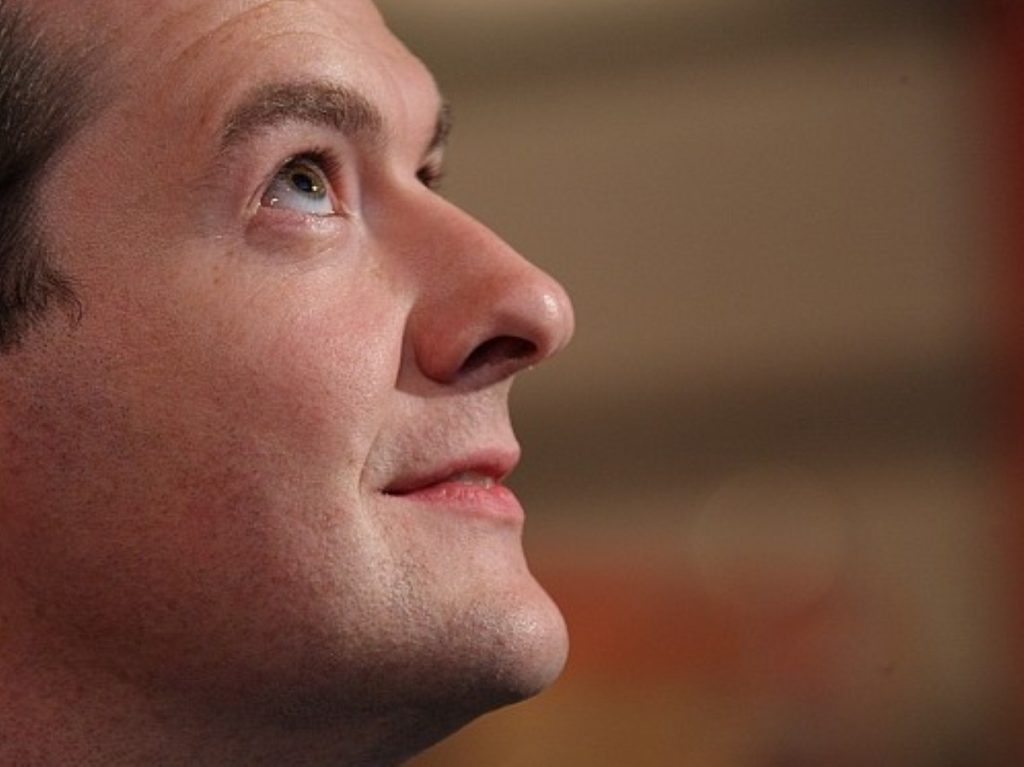Osborne steals the limelight with benefits crackdown
By Ian Dunt
Benefit payments to individual families will be capped at the average income, George Osborne has announced.
The chancellor, who has a habit of making pivotal policy announcements at the Tory party conference, delivered a crowd-pleasing speech mapping out a future of “liberty and justice” for Britain.
The benefits announcement comes on top of a decision to end child benefit for households earning over £44,000.


That decision prompted an angry reaction from some Conservative commentators and women’s groups, as well as trade unions and advocates of a universal welfare system, suggesting the chancellor has a fight on his hands.
High-earners to lose child benefit
“Without reform” Mr Osborne said, Britain’s welfare system “is financially unaffordable and morally indefensible”.
But analysts were immediately split by the ramifications of the benefits cap announcement.
Aides to Mr Osborne insisted 50,000 workless families would lose an average of £93 per week when it was introduced in three years time.
Other independent estimates suggested that as many as 350,000 families could be affected.
The Social Market Foundation (SMF) quickly came out against the cap, saying it would have a disproportionate effects on single-parent families with three or more children living in urban areas.
“A blanket approach is likely to be unfair. The right way to tackle abuse of the benefit system is through tailored welfare to work schemes that provide both carrot and stick,” SMF director and tax and benefits specialist Ian Mulheirn said.
“A further consequence of the cap will be to price big families out of urban accommodation, something that will have a profound effect on the shape of our communities.”
Unison said Mr Osborne “played to petty ignorance about people on benefit”.
TUC general secretary Brendan Barber said: “Everyone can agree that we need a fairer economy built on higher, better balanced growth but the spending and benefit cuts will do the opposite – pushing many people into poverty, hitting middle income Britain hard and threatening growth.”
In the remainder of his speech, the chancellor wasted no time attacking Labour’s new leader, Ed Miliband.
“Every Labour government runs out of money and brings this country to the brink of bankruptcy,” he told the audience in Birmingham.
“When it comes to the next election, we will say to the British people: ‘Don’t give the keys back to the people who crashed the car’.”
Mr Osborne was keen to paint the Labour leader as deluded on the issue of the deficit, despite Mr Miliband’s attempts to strike a conciliatory note on the issue during his party conference speech.
“There are two sides to this argument,” Mr Osborne said.
“On the one side there is the IMF, the OECD, the credit rating agencies, the bond markets, the European commission, the CBI, the IoD, the BCC, the governor of the Bank of England, most British businesses, two of our historic political parties, one of the Miliband brothers, Tony Blair and the British people.
“And on the other side there’s Ed Miliband. The national interest or the vested interest. I know which side we’re on.”
Mr Osborne was keen to highlight areas of government policy promoted by the Liberal Democrats in Liverpool last week. He promised that he would crack down on bank bonuses where the institutions fail to lend to small businesses, and said he would focus on tax evasion.
He finished his speech with a rousing segment around the theme of the Tory conference – the national interest.
“You don’t get to choose the times you have to live in. But you do get to choose how you to live in them. And just over the horizon lies the Britain we are trying to build,” he said.
“Let us be a hopeful country, because we govern with imagination. Let us be a united country, because we govern with fairness. Let us be a prosperous country, because we govern with courage. Over the horizon is a Britain that makes its way in the world, a Britain that is a beacon for liberty and justice.
“There may be moments where we can’t see it, when it seems just out of reach. But it is always there, calling us to our task, the task of this generation, the task of the British people, together in the national interest.”
The speech, which was enthusiastically received in the hall, confirmed Mr Osborne’s reputation as a conference highlight.
Last year the then-shadow chancellor delivered one of the most memorable and important speeches of the conference with his oft-repeated pledge that “we’re all in this together”.
That phrase has now come back to haunt him on several occasions, as economic analysts deliver judgements suggesting his policies take more from the poor than they do the rich.
But the rhetorical approach adopted by Mr Osborne last year has helped facilitate cooperation between the Tories and the Liberal Democrats, who rely on the ‘progressive’ tag to sell the deficit reduction agenda to their supporters.
It is also behind moves such as the scrapping of child benefits for high earners, which has the fortunate political side-effect of demonstrably proving that medium and high earners are having as tough a time of it as those on low incomes.
Mr Osborne has a habit of making game-changing conference speeches. His announcement of inheritance tax reform plans at the 2007 conference played a major role in convincing Gordon Brown not to hold an early election.
Mr Osborne has little more than a fortnight to complete the comprehensive spending review, which will implement departmental budget cuts of at least a quarter in a bid to tackle Britain’s deficit.
The Tory party conference continues in Birmingham until Wednesday.

